module 1 small talk introduction and reading
文档属性
| 名称 | module 1 small talk introduction and reading |
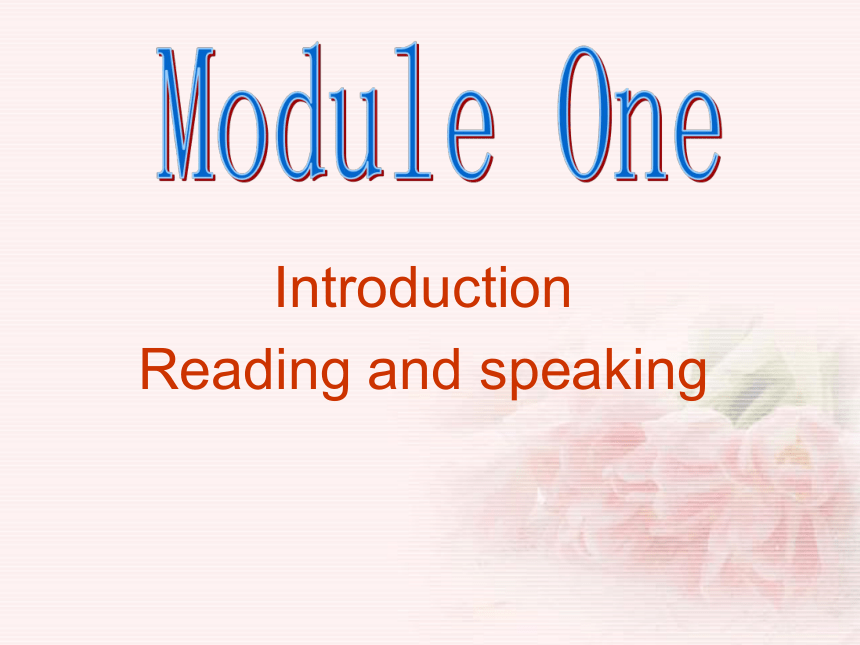
|
|
| 格式 | rar | ||
| 文件大小 | 71.1KB | ||
| 资源类型 | 教案 | ||
| 版本资源 | 外研版 | ||
| 科目 | 英语 | ||
| 更新时间 | 2007-12-10 00:00:00 | ||
图片预览

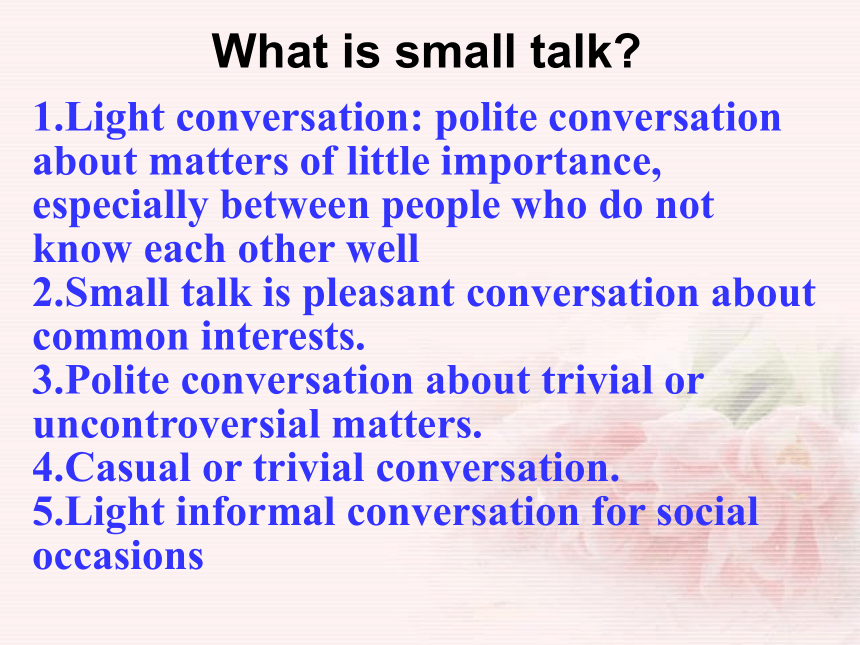

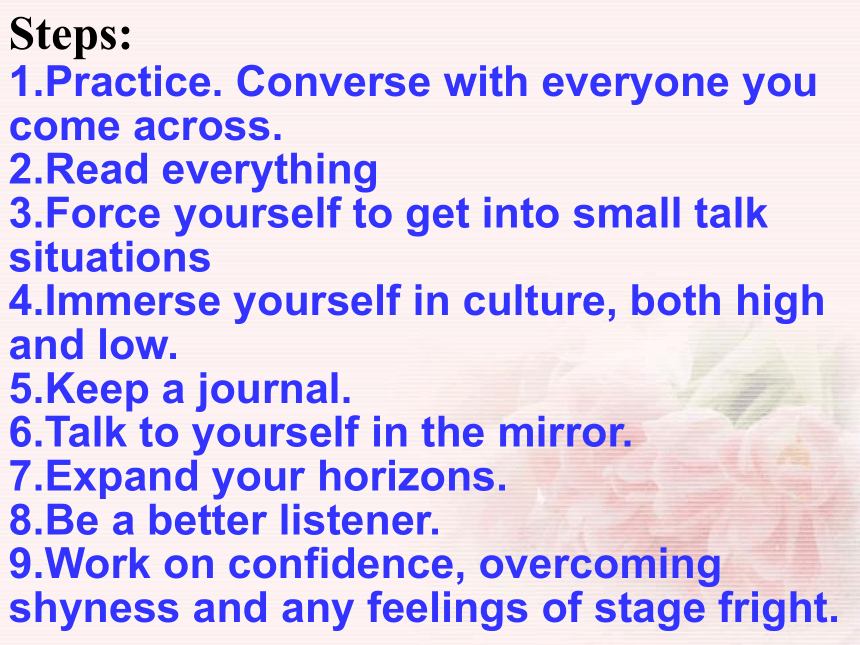

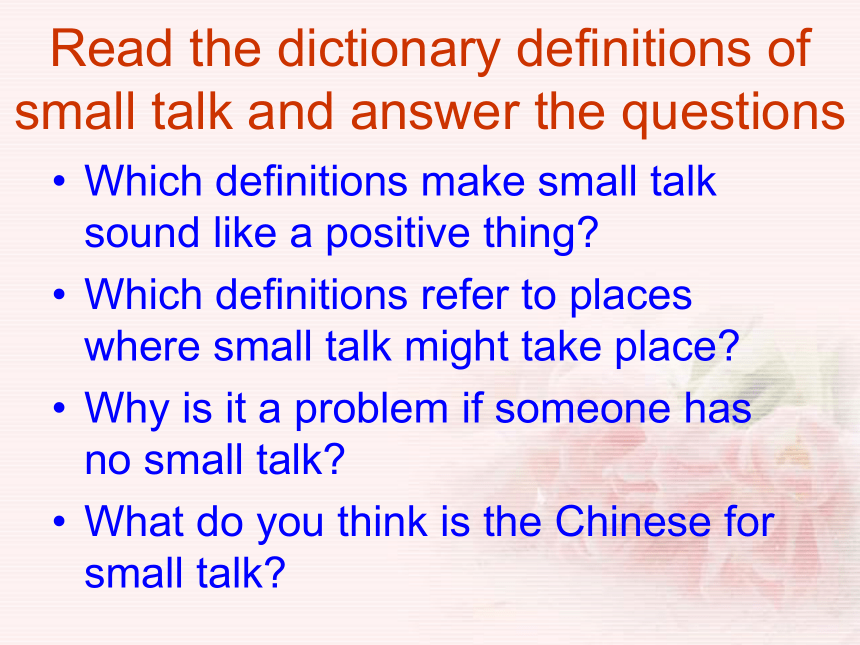
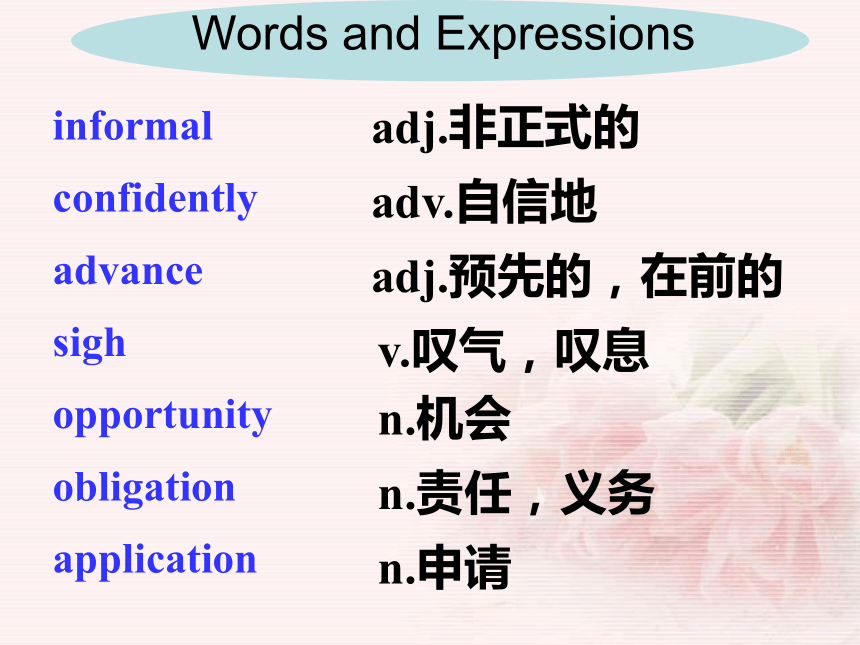
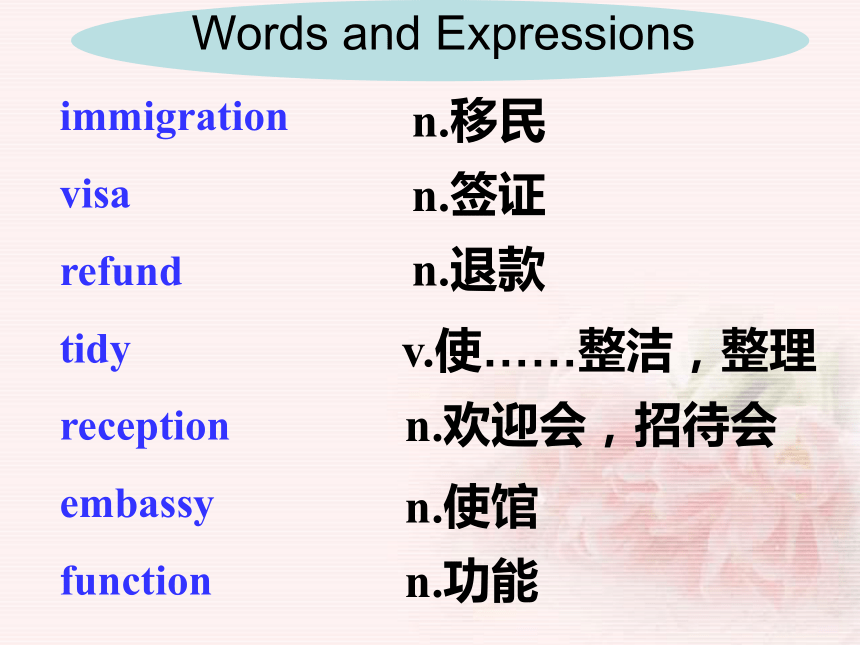
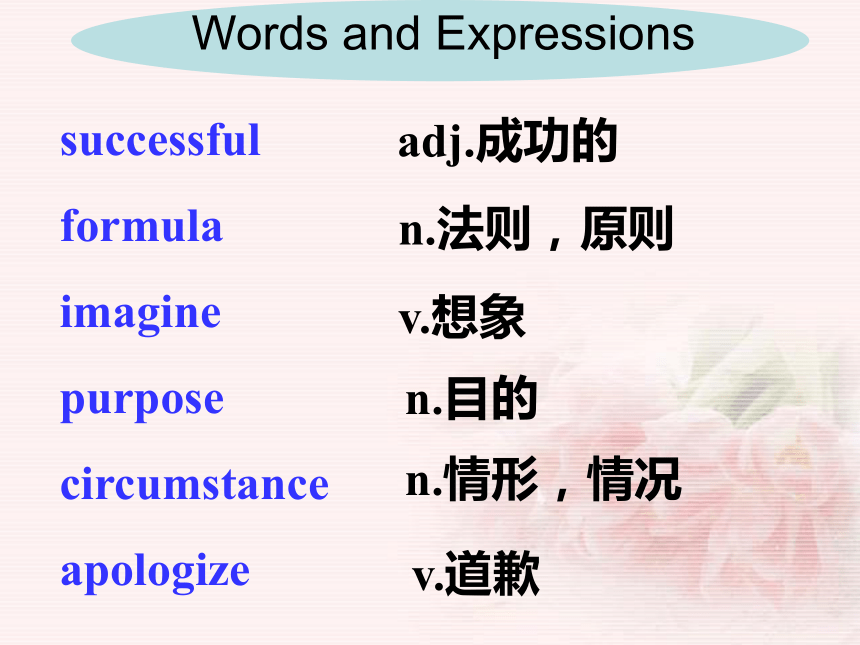
文档简介
课件28张PPT。Introduction
Reading and speaking
Module One What is small talk? 1.Light conversation: polite conversation about matters of little importance, especially between people who do not know each other well
2.Small talk is pleasant conversation about common interests.
3.Polite conversation about trivial or uncontroversial matters.
4.Casual or trivial conversation.
5.Light informal conversation for social occasions Discuss how to make small talk Small talk can be a big challenge, but a little preparation and confidence is all you need. Tips:1.Be yourself. Keep in mind that confidence and humor are superb substitutes for comedic genius or wit.
2.Remember, you never have to do it alone.
3.Keep a few exit lines in mind too. For example, “Thanks for the wonderful chat, but I must make believe I'm interested in everybody else.” Steps:1.Practice. Converse with everyone you
come across.
2.Read everything
3.Force yourself to get into small talk
situations
4.Immerse yourself in culture, both high
and low.
5.Keep a journal.
6.Talk to yourself in the mirror.
7.Expand your horizons.
8.Be a better listener.
9.Work on confidence, overcoming
shyness and any feelings of stage fright. Famous DictionariesMacmillan English Dictionary
Longman Dictionary of Contemporary English
Collins Cobuild English Language Dictionary
Oxford Advanced Learner’s DictionaryRead the dictionary definitions of small talk and answer the questionsWhich definitions make small talk sound like a positive thing?
Which definitions refer to places where small talk might take place?
Why is it a problem if someone has no small talk?
What do you think is the Chinese for small talk?
informal
confidently
advance
sigh
opportunity
obligation
application adj.非正式的adv.自信地adj.预先的,在前的v.叹气,叹息n.机会n.责任,义务n.申请immigration
visa
refund
tidy
reception
embassy
fun_ction n.移民n.签证n.退款v.使……整洁,整理n.欢迎会,招待会n.使馆n.功能successful
formula
imagine
purpose
circumstance
apologize adj.成功的n.法则,原则v.想象n.目的n.情形,情况v.道歉small talk
think of
look away from
in addition
find out
leave out闲谈,聊天想起,回忆起把目光从……移开除此之外,另外了解(到),找到(信息)遗漏,漏掉Vocabulary and reading Ex1Complete the sentences with the correct form of the words in the box.
The singer was really good! She _________ me a lot!
He had an accident and _________ his bicycle.
Don’t shout at the children. You should ________ them to do better.
Make sure you _______ for your English examination. Do more homework!
At the party, I __________ a boy who used to attend my school.
damage encourage impress prepare recognisedamagedencourageimpressed preparerecognised
Skimming the passage Decide what kind of book it is from.
It is from a book which tells you what to do at social events. We can guess from the title “How Good Are Your Social Skills” and subtitles “Learn how to do small talk”, “Develop your listening skills” and “Learn the rules”.
ScanningThe general idea:
This passage is about social skills. It tells us how to have a conversation and how to do small talk and when we go to a social occasion, we should pay attention to social rules in different countries.The main idea of each paragraph:Part 1 (Paras.1-2) Introduction to the body of the passage by asking questions
Part 2 (Para.3) How to do small talk
Part 3 (Paras.4-6) Dos and don’ts while listening
Part 4 (Paras. 7-8) The social rulesFast reading Ex 2 Read the passage and decide what kind of book it is from. Choose from. Choose from this list.
1 an English teaching book
A business course
A book which tells you what to do at social events
A book to help you prepare for a speaking examinationEx 3 Read the passage again and answer the questions. According to the article, should people plan what they’re going to say at parties?
What do people think about those who talk too much?
Describe two things you shouldn’t do in a conversation.
Why is it a good idea to nod and smile when the other person is talking?
What does the quotation from Benjamin Disraele tell you about people?Answers to the questions aboveYes, they should prepare some topics to talk about.
They are not impressive.
Look at your watch; yawn ( sigh, look away, change the subject, finish other people’s sentences)?
To show that your are listening.
People like talking about themselves.when I meet strangers, I don’t like to talk about myself, so I ____ answering personal questions.
where are very few foreign visitors to my town, so we ______ the opportunity to meet people from other countries.
I said that we don’t have enough opportunity to speak English and he ______ his head in agreement.
I think the man I spoke to was tired- he _____ a lot.
He looked very sad when I asked him about his home. He _____ when he answered me.
I felt very welcome when I arrived at the party. The host___________ at me and shook my hand.sigh yawn nod avoid lack smileavoidlack noddedyawnedsmiledsighedEx 5 Look at the phrases from the passage and answer the questions.If you can talk confidently, does this mean that you are worried about talking to people?
What kind of advance planning could you do before going to a party in a foreign country?
Can you give an example of a low-risk conversation opener if you were talking to a friend of your parents’, for example?
What encouraging noises and gestures can you make when you’re having a conversation in Chinese?
What is an example of positive body language?
‘Are social rules the same in every country?No, it doesn’t.
You could find out what the social conventions are about arriving, leaving and bringing gifts.
“Did you watch the Cup Final last Saturday?”/ “Have you seen the new James Bond film?”
Smiling, nodding, saying “yes” and “Oh, really?” etc.
Facing the person who is speaking and making eye contact.
No, they aren’t.
Answers to the questions aboveEx 6 work in pairs. Discuss your opinion about the following.Which of the ideas in the reading passage do you think are useful in your society?
Are there any conversation techniques that you think you will use in the future?
Which of the listening skills are you good at?
Which of the social skills do you need to improve?
What are some of the usual small talk topics in China?1. I think advance planning is very useful. I never paid attention to it before. That is, I didn’t do any advance planning before I went to a party. For example, I didn’t buy proper presents in advance. In a hurry, the present bought was sometimes unsuitable for the host. I seldom tried to know about other guests. Without advance preparations, sometimes I would get embarrassed.2. I will go to university abroad after graduation. I will meet people from different countries. In order to contact with them very well, I must know about their customs and social rules. So at the beginning I will think of “safe” or low-risk topics to talk about. I believe soon I will make friends with them.3. I am good at keeping good eye contact with an attentive look. You know, eyes are windows of minds. From my eyes, the speaker knows that I am interested in what he is talking about. It is good manners, even in other countries.4. Sometimes I don’t know what proper topics to choose when I meet strangers. Most of the time I keep silent. The moment is a hard time to me. From this passage I know a little about how to do small talk. I believe later when I meet with the similar occasion. I can manage.5. In everyday life, parents choose to talk about their children –their children’s life, studies, hobbies. Teachers get together to talk about their students- good or bad at some subjects or the results of examinations.Today we have learnt the passage
about social skills which had
much to do with our daily life.
From the passage we know that
social skills are very important
when a person is in
communication or having a
conversation with others. We have
also learnt some social rules and
how to do small talk. It is
necessary for us to learn
something about social skills. As you know, we are now working hard to build a harmonious society if we don’t know how to behave in communicating with others. Especially, in 2008 the Olympic Games will be held in Beijing in our country. At that time how will we display our good manners to the whole world? So we must learn more about this inside or outside class.
Reading and speaking
Module One What is small talk? 1.Light conversation: polite conversation about matters of little importance, especially between people who do not know each other well
2.Small talk is pleasant conversation about common interests.
3.Polite conversation about trivial or uncontroversial matters.
4.Casual or trivial conversation.
5.Light informal conversation for social occasions Discuss how to make small talk Small talk can be a big challenge, but a little preparation and confidence is all you need. Tips:1.Be yourself. Keep in mind that confidence and humor are superb substitutes for comedic genius or wit.
2.Remember, you never have to do it alone.
3.Keep a few exit lines in mind too. For example, “Thanks for the wonderful chat, but I must make believe I'm interested in everybody else.” Steps:1.Practice. Converse with everyone you
come across.
2.Read everything
3.Force yourself to get into small talk
situations
4.Immerse yourself in culture, both high
and low.
5.Keep a journal.
6.Talk to yourself in the mirror.
7.Expand your horizons.
8.Be a better listener.
9.Work on confidence, overcoming
shyness and any feelings of stage fright. Famous DictionariesMacmillan English Dictionary
Longman Dictionary of Contemporary English
Collins Cobuild English Language Dictionary
Oxford Advanced Learner’s DictionaryRead the dictionary definitions of small talk and answer the questionsWhich definitions make small talk sound like a positive thing?
Which definitions refer to places where small talk might take place?
Why is it a problem if someone has no small talk?
What do you think is the Chinese for small talk?
informal
confidently
advance
sigh
opportunity
obligation
application adj.非正式的adv.自信地adj.预先的,在前的v.叹气,叹息n.机会n.责任,义务n.申请immigration
visa
refund
tidy
reception
embassy
fun_ction n.移民n.签证n.退款v.使……整洁,整理n.欢迎会,招待会n.使馆n.功能successful
formula
imagine
purpose
circumstance
apologize adj.成功的n.法则,原则v.想象n.目的n.情形,情况v.道歉small talk
think of
look away from
in addition
find out
leave out闲谈,聊天想起,回忆起把目光从……移开除此之外,另外了解(到),找到(信息)遗漏,漏掉Vocabulary and reading Ex1Complete the sentences with the correct form of the words in the box.
The singer was really good! She _________ me a lot!
He had an accident and _________ his bicycle.
Don’t shout at the children. You should ________ them to do better.
Make sure you _______ for your English examination. Do more homework!
At the party, I __________ a boy who used to attend my school.
damage encourage impress prepare recognisedamagedencourageimpressed preparerecognised
Skimming the passage Decide what kind of book it is from.
It is from a book which tells you what to do at social events. We can guess from the title “How Good Are Your Social Skills” and subtitles “Learn how to do small talk”, “Develop your listening skills” and “Learn the rules”.
ScanningThe general idea:
This passage is about social skills. It tells us how to have a conversation and how to do small talk and when we go to a social occasion, we should pay attention to social rules in different countries.The main idea of each paragraph:Part 1 (Paras.1-2) Introduction to the body of the passage by asking questions
Part 2 (Para.3) How to do small talk
Part 3 (Paras.4-6) Dos and don’ts while listening
Part 4 (Paras. 7-8) The social rulesFast reading Ex 2 Read the passage and decide what kind of book it is from. Choose from. Choose from this list.
1 an English teaching book
A business course
A book which tells you what to do at social events
A book to help you prepare for a speaking examinationEx 3 Read the passage again and answer the questions. According to the article, should people plan what they’re going to say at parties?
What do people think about those who talk too much?
Describe two things you shouldn’t do in a conversation.
Why is it a good idea to nod and smile when the other person is talking?
What does the quotation from Benjamin Disraele tell you about people?Answers to the questions aboveYes, they should prepare some topics to talk about.
They are not impressive.
Look at your watch; yawn ( sigh, look away, change the subject, finish other people’s sentences)?
To show that your are listening.
People like talking about themselves.when I meet strangers, I don’t like to talk about myself, so I ____ answering personal questions.
where are very few foreign visitors to my town, so we ______ the opportunity to meet people from other countries.
I said that we don’t have enough opportunity to speak English and he ______ his head in agreement.
I think the man I spoke to was tired- he _____ a lot.
He looked very sad when I asked him about his home. He _____ when he answered me.
I felt very welcome when I arrived at the party. The host___________ at me and shook my hand.sigh yawn nod avoid lack smileavoidlack noddedyawnedsmiledsighedEx 5 Look at the phrases from the passage and answer the questions.If you can talk confidently, does this mean that you are worried about talking to people?
What kind of advance planning could you do before going to a party in a foreign country?
Can you give an example of a low-risk conversation opener if you were talking to a friend of your parents’, for example?
What encouraging noises and gestures can you make when you’re having a conversation in Chinese?
What is an example of positive body language?
‘Are social rules the same in every country?No, it doesn’t.
You could find out what the social conventions are about arriving, leaving and bringing gifts.
“Did you watch the Cup Final last Saturday?”/ “Have you seen the new James Bond film?”
Smiling, nodding, saying “yes” and “Oh, really?” etc.
Facing the person who is speaking and making eye contact.
No, they aren’t.
Answers to the questions aboveEx 6 work in pairs. Discuss your opinion about the following.Which of the ideas in the reading passage do you think are useful in your society?
Are there any conversation techniques that you think you will use in the future?
Which of the listening skills are you good at?
Which of the social skills do you need to improve?
What are some of the usual small talk topics in China?1. I think advance planning is very useful. I never paid attention to it before. That is, I didn’t do any advance planning before I went to a party. For example, I didn’t buy proper presents in advance. In a hurry, the present bought was sometimes unsuitable for the host. I seldom tried to know about other guests. Without advance preparations, sometimes I would get embarrassed.2. I will go to university abroad after graduation. I will meet people from different countries. In order to contact with them very well, I must know about their customs and social rules. So at the beginning I will think of “safe” or low-risk topics to talk about. I believe soon I will make friends with them.3. I am good at keeping good eye contact with an attentive look. You know, eyes are windows of minds. From my eyes, the speaker knows that I am interested in what he is talking about. It is good manners, even in other countries.4. Sometimes I don’t know what proper topics to choose when I meet strangers. Most of the time I keep silent. The moment is a hard time to me. From this passage I know a little about how to do small talk. I believe later when I meet with the similar occasion. I can manage.5. In everyday life, parents choose to talk about their children –their children’s life, studies, hobbies. Teachers get together to talk about their students- good or bad at some subjects or the results of examinations.Today we have learnt the passage
about social skills which had
much to do with our daily life.
From the passage we know that
social skills are very important
when a person is in
communication or having a
conversation with others. We have
also learnt some social rules and
how to do small talk. It is
necessary for us to learn
something about social skills. As you know, we are now working hard to build a harmonious society if we don’t know how to behave in communicating with others. Especially, in 2008 the Olympic Games will be held in Beijing in our country. At that time how will we display our good manners to the whole world? So we must learn more about this inside or outside class.
